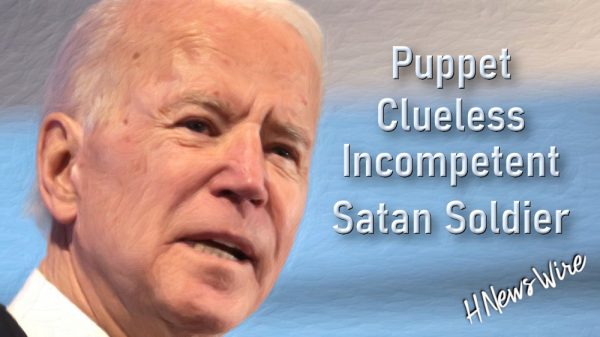Update: ‘Big Oil’ Responds To Satan Soldier Obama Biden’s Threats: Here’s 10 Things You Can Do To Ease Gas Prices, The Question Is – Will the Obama Biden Administration Do Any of Them?

HNewsWire:
Chevron has hit back at the Biden administration, claiming that their policies since January 2021 have sent a message that it aims to "impose obstacles to our industry delivering energy resources the world needs," according to Bloomberg's Annmarie Hordern, citing a statement by the company.
Chevron's response to Biden's letter to big oil: "Unfortunately, what we have seen since January 2021 are policies that send a message that the Administration aims to impose obstacles to our industry delivering energy resources the world needs."
— annmarie hordern (@annmarie) June 16, 2022
Chevron says they plan to boost production in the Permian basin by more than 15% this year, while its overall upstream capital investments in the US have climbed 35% in the last year.
What's more, Chevron's US refineries are operational, and input grew to 915k b/d on average in Q1, vs 881k b/d the same quarter a year ago.
The statement comes after the Biden administration set out on a blame campaign - telling Americans that high prices at the pump are due to corporate greed by oil companies, and not his administration's haphazard energy policies. The new offensive included a letter to Big Oil execs threatening them with forced production quotas, windfall taxes, and/or price-caps.
The latest dust-up comes less than two weeks after Chevron CEO Mike Wirth told Bloomberg TV that there will "never be another refinery built in the US" thanks to the state of policies around the world towards fossil fuels.
In response to the Biden administration, Exxon Mobil issued a reasoned response to The White House accusations and scapegoating:
We have been in regular contact with the administration to update the President and his staff on how ExxonMobil has been investing more than any other company to develop U.S. oil and gas supplies. This includes investments in the U.S. of more than $50 billion over the past five years, resulting in an almost 50% increase in our U.S. production of oil during this period.
Globally, we’ve invested double what we’ve earned over the past five years -- $118 billion on new oil and gas supplies compared to net income of $55 billion. This is a reflection of the company’s long-term growth strategy, and our commitment to continuously invest to meet society’s demand for our products.
Specific to refining capacity in the U.S., we’ve been investing through the downturn to increase refining capacity to process U.S. light crude by about 250,000 barrels per day – the equivalent of adding a new medium-sized refinery. We kept investing even during the pandemic, when we lost more than $20 billion and had to borrow more than $30 billion to maintain investment to increase capacity to be ready for post-pandemic demand.
In the short term, the U.S. government could enact measures often used in emergencies following hurricanes or other supply disruptions -- such as waivers of Jones Act provisions and some fuel specifications to increase supplies.
Longer term, government can promote investment through clear and consistent policy that supports U.S. resource development, such as regular and predictable lease sales, as well as streamlined regulatory approval and support for infrastructure such as pipelines.
Meanwhile, as we noted on Wednesday, the American Petroleum Institute laid out 10 things the Biden administration can do to ease gas prices.
1. Lift Development Restrictions on Federal Lands and Waters
The Department of the Interior (DOI) should swiftly issue a 5-year program for the Outer Continental Shelf and hold mandated quarterly onshore lease sales with equitable terms. DOI should reinstate canceled sales and valid leases on federal lands and waters.
2. Designate Critical Energy Infrastructure Projects
Congress should authorize critical energy infrastructure projects to support the production, processing, and delivery of energy. These projects would be of such concern to the national interest that they would be entitled to undergo a streamlined review and permitting process not to exceed one year.
3. Fix the NEPA Permitting Process
Your administration should revise the National Environmental Policy Act (NEPA) process by establishing agency uniformity in reviews, limiting reviews to two years, and reducing bureaucratic burdens placed on project proponents in terms of size and scope of application submissions.
4. Accelerate LNG Exports and Approve Pending LNG Applications
Congress should amend the Natural Gas Act to streamline the Department of Energy (DOE) to a single approval process for all U.S. liquefied natural gas (LNG) projects. DOE should approve pending LNG applications to enable the U.S. to deliver reliable energy to our allies abroad.
5. Unlock Investment and Access to Capital
The Securities and Exchange Commission should reconsider its overly burdensome and ineffective climate disclosure proposal and your administration should ensure open capital markets where access is based upon individual company merit free from artificial constraints based on government-preferred investment allocations.
6. Dismantle Supply Chain Bottlenecks
You should rescind steel tariffs that remain on imports from U.S. allies as steel is a critical component of energy production, transportation, and refining. Your administration should accelerate efforts to relieve port congestion so that equipment necessary for energy development can be delivered and installed.
7. Advance Lower Carbon Energy Tax Provisions
Congress should expand and extend Section 45Q tax credits for carbon capture, utilization, and storage development and create a new tax credit for hydrogen produced from all sources.
8. Protect Competition in the Use of Refining Technologies
Your administration should ensure that future federal agency rule makings continue to allow U.S. refineries to use the existing critical process technologies to produce the fuels needed for global energy markets.
9. End Permitting Obstruction on Natural Gas Projects
The Federal Energy Regulatory Commission should cease efforts to overstep its permitting authority under the Natural Gas Act and should adhere to traditional considerations of public needs as well as focus on direct impacts arising from the construction and operation of natural gas projects.
10. Advance the Energy Workforce of the Future
Congress and your administration should support the training and education of a diverse workforce through increased funding of work-based learning and advancement of STEM programs to nurture the skills necessary to construct and operate oil, natural gas, and other energy infrastructure.

HNewsWire:

HNewsWire:
Exxon Mobil responded to the White House accusations and scapegoating with a reasoned response to Satan Soldier Biden's letter to many 'Big Oil' executives, threatening them with forced production quotas, windfall taxes, and/or price-caps (because all of those things have proven so successful in previous crises... not). (Our focus)
We've been in touch with the administration on a regular basis to inform the President and his team on how ExxonMobil has invested more than any other firm in developing U.S. oil and gas reserves. This includes more than $50 billion in investments made in the US during the last five years, which have led to a nearly 50% rise in our country's oil output during this time.
Over the last five years, we've spent $118 billion on additional oil and gas supplies throughout the world, compared to $55 billion in net profits. This reflects the company's long-term development plan, as well as our commitment to invest in order to fulfill society's demand for our goods.
In terms of refining capacity in the United States, we've been investing throughout the downturn to enhance refining capacity to process US light crude by roughly 250,000 barrels per day, which is the equivalent of building a new medium-sized refinery. Even during the pandemic, when we lost more than $20 billion and had to borrow more than $30 billion to keep investing in order to be ready for post-pandemic demand, we continued investing.
In the near run, the US government might take steps similar to those used in the aftermath of hurricanes and other supply interruptions, such as exemptions of Jones Act rules and certain gasoline standards to boost supplies.
Longer term, the government may encourage investment by establishing clear and consistent policies that favor US resource development, including as frequent and predictable lease sales, expedited regulatory clearance, and assistance for infrastructure like pipelines.
In addition, the American Petroleum Institute, which represents 'Big Oil,' issued a letter to President Obama, based on Exxon's recommendations.
The letter opens by thanking President Biden for his efforts to confront Russia's conduct, before focusing on how we arrived at this point:
"Unfortunately, Russia's actions and the resulting volatility have exacerbated an already-developing global energy crisis. A major and ongoing supply and demand imbalance in global oil markets has resulted from a number of variables. As world economies have recovered from the early stages of the COVID-19 pandemic, demand for energy, particularly crude oil, has increased. In part, this is due to worldwide under investment in recent years, which has been influenced by geopolitical and market pressures, government policies, and investor mood.
This confluence of forces and events has resulted in the current scenario. Specifically, the most serious energy problem since the 1970s."
The API then outlines eleven ways that President Biden might do to alleviate bottlenecks and cut gas costs for the "ordinary joe."
1. Remove restrictions on development on federal lands and waters
The Department of the Interior (DOI) should develop a 5-year plan for the Outer Continental Shelf as soon as possible, and arrange equitable quarterly onshore lease auctions. On federal lands and waterways, the Department of the Interior should restore canceled sales and legitimate leases.
2. Designate Projects for Critical Energy Infrastructure
To assist the generation, processing, and transport of energy, Congress should fund vital energy infrastructure projects. These projects would be so important to the national interest that they would be eligible for a one-year accelerated evaluation and approval procedure.
3. Make the NEPA permitting process more efficient.
Your administration should modify the National Environmental Policy Act (NEPA) process by ensuring agency consistency in reviews, restricting reviews to two years, and decreasing the administrative costs put on project proponents in terms of application size and scope.
4. Accelerate LNG exports and approve LNG applications that have been pending.
The Natural Gas Act should be amended to simplify the Department of Energy's (DOE) clearance procedure for all liquefied natural gas (LNG) projects in the United States. To allow the United States to offer dependable energy to our friends overseas, the Department of Energy should approve pending LNG applications.
5. Increase Investment and Capital Access
Your administration should ensure open capital markets where access is based on individual company merit rather than artificial constraints based on government-preferred investment allocations, and the Securities and Exchange Commission should reconsider its overly burdensome and ineffective climate disclosure proposal.
6. Eliminate bottlenecks in the supply chain
Steel is a crucial component of energy production, transportation, and refining, thus you should remove steel tariffs that remain on imports from US allies. Your government should make strenuous efforts to ease port congestion so that energy development equipment may be shipped and installed.
7. Make Lower Carbon Energy Tax Provisions a Priority
Section 45Q tax credits for carbon capture, utilization, and storage development should be expanded and extended, and a new tax credit for hydrogen generated from all sources should be created.
8. Ensure that competition in the use of refining technologies is protected.
Your administration should guarantee that future federal agency rule-makings continue to enable U.S. refineries to provide the fuels required for global energy markets using current vital process technology.
9. Put an end to Natural Gas Project Permit Obstruction.
The Federal Energy Regulatory Commission should stop attempting to overstep its permitting power under the Natural Gas Act and stick to conventional public needs assessments, focusing on direct consequences from natural gas project development and operation.
10. Strengthen the Future Energy Workforce
Increased financing for work-based learning and development of STEM programs should be supported by Congress and your administration in order to cultivate the skills required to build and run oil, natural gas, and other energy infrastructure.
Will the Biden administration take any of these steps?
SRH: Satan Soldier Biden Is Blaming Energy Companies for His Own Failures as a Want-Be President, and Not Only That-He Is Also Going to Beg and Grovel the Known Terrorist Saudi Arabia While Bashing His Own Domestic Producers


Newsletter
Support Orphans

Editor's Bio

A Thrilling Ride
Every once in awhile, a book comes across your path that is impossible to put down. A Long Journey Home is not a casual book that you read in a week or earmark to complete at a later date. Once you begin, cancel your schedule, put your phone on silent, find a quiet place where you cannot be disturbed, and complete the journey. Click Here to Purchase on Amazon.com!
Recent News
Watchman: Rumble Defies Global Censorship Trends, Takes Stand Against New Zealand’s Free Speech Crackdown
By StevieRay Hansen |
Twitter Is Suppressing Free Speech Under the Direct Orders of the Government. So What Else Is the Government Hiding?
By StevieRay Hansen |
Watchman: Once Satan’s Soldiers Eliminate Free Speech, Life Becomes a Cheap Ruse—Brazil Imprisons a Conservative Congressman for Eight Years Over a YouTube Video, America Is Next, Google Is Evil and Tribulation On Steroids
By StevieRay Hansen |
Watchman: At Some Point, You’re Going to Realize That Twitter Is Just Like Fox News, Which Has Turned On Its Conservative and Christian Audience. Mr. Musk Is a Globalist and Satan Worshiper, and He Has Misled You Into Thinking That Twitter Belongs to the Free Speech Audience. Not True…
By StevieRay Hansen |
Watchman’s Daily Devotional, A Lie Is Offered to Those Who Will Not Love the Truth. Truth-Seekers Face Constant Opposition Until They Choose to Reject the Last Lies
By StevieRay Hansen |
Watchman: They Killed With Immunity, Bill Gates,Google and Our Own Government
By StevieRay Hansen |
Reach People







